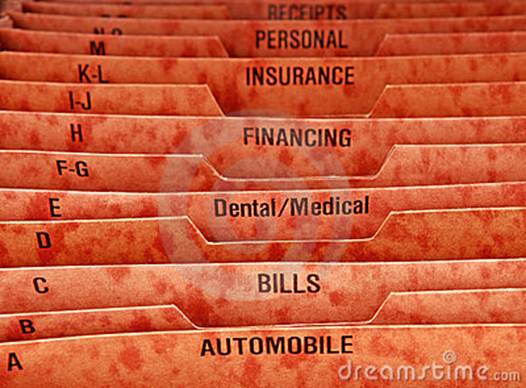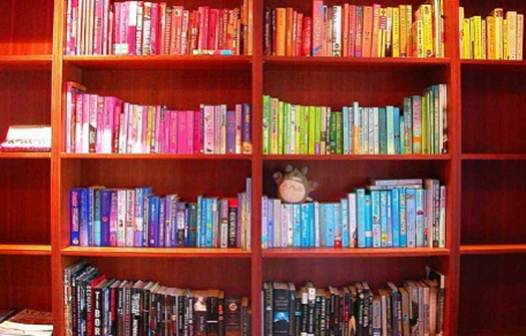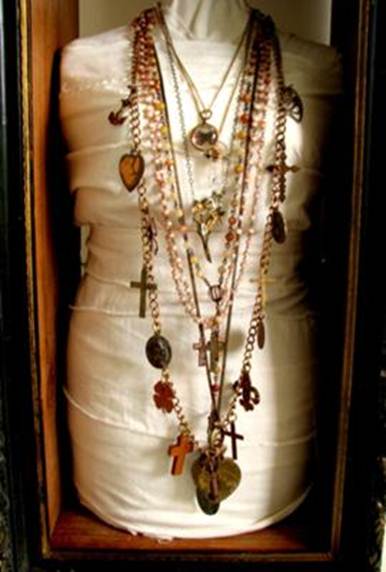Get your desk under control
I’m organizationally challenged, and until
recently, my place had absolutely no order. I didn’t own a single file. I made
it a priority to create a system that not only kept things organized, but was
also aesthetically pleasing.
I realized that my teetering stacks of
papers, receipts and documents had to go, so I bought a simple filing cabinet.
The hardest part is implementing a system that works, but once it’s been
created, your life will be free of clutter and chaos.
1. Categorise Pick several main categories
that will work for you. Mine are Home, Legal, Personal, Financial, Medical,
Blog and To Do. I keep a small filing folder on my desk that has these
sections, so when I don’t have time to file things completely, I just stick
papers into their corresponding category.

I
keep a small filing folder on my desk that has these sections
2. Create sub-sections In my filing
cabinet, I have my main categories with smaller folders within. For example,
within my Financial section, I have folders dedicated to things like banking,
bills etc. Think beyond the obvious sections and include things that are
typically left uncategorized. If you want a secure place to store your passport
or a folder that keeps track of gift ideas, create one.
3. Consider going digital Almost everything
can be stored digitally. Have all your statements emailed to you; scan and save
important documents and photos. The most critical aspect of storing digitally
is to back up your work onto an external hard drive. I set myself a reminder
once a month.
4. Separate To keep your desk drawers neat,
measure out the space and buy dividers so that everything is easily accessible.
Shelve it
1. How to organize your booksheft Use your
bookshelves as part of the overall décor, not just to store your books. How you
display them is equally important.
Take note of what you own; that way, you’ll
have a better idea of how to put it all together. Do you own mostly hardbacks,
large books, entire series or travel guides? Think of the books that make sense
to group together (like cookbooks). Focus on interesting details (like the
colours) and group things together based on similar hues. This creates depth
and different focal points.
Use books with unique covers as displays –
turning them so that they face outward. This adds character to your shelves and
is a great way to display books that might have special meaning. I display the
cover of my copy of The Catcher In The Rye: it’s beat-up and the pages
are falling out, but that’s what makes it really pop.
2. Get creative Don’t just line your books
up and fill up the entire shelf. Turn some over on their sides, use bookends,
and lean some diagonally. It’s much more interesting to look at a bookshelf that
has some variation.

It’s
much more interesting to look at a bookshelf that has some variation
3. Think beyond books Do you have a piece
of art that doesn’t have a place, or a beautiful vase that you never remember
to use? Those are great pieces to add to a bookshelf to keep it from looking
too much like a library. Disperse them around evenly, using them in lieu of
bookends or setting them atop stacks of books.
4. Combine old and new One of my favourite
aspects of being in a library is how many old reassures you uncover. I try to
implement that same concept with my bookshelves: I might, for example,
juxtapose a glossy vase with a rickety ladder.
5. Nothing is off limits In fact, the more
outlandish items on your bookshelf, the better! Instead of keeping my childhood
books and games hidden, I display them. They add a fun contrast and a lived-in
feel.
6. Customize Paint the backing of the shelf
a bright colour, or wrap hardbacks in paper – keep it relatively co-ordinated,
like plain brown or white wrapping paper or a great pattern. Little touches
make a big difference.
Beat closet clutter
One of the best things about having a
functional wardrobe (no matter what size) is that you can see everything you
own and are more likely to wear it.
1. Edit Make sure your closet is filled
only with items that are flattering, comfortable and on trend. There’s no use
holding on to things that you never wear; it doesn’t matter if it was a gift –
if you’re not reaching for it regularly (at least a couple of times a year),
donate it.
2. Take stock If you already have three
pairs of skinny jeans and a collection of black blazers, downsize. Keep only
the ones you love, that are in good condition, fit perfectly and are still
current.
3. Use the space Invest in slimline hangers
that take up less space, use pretty boxes to store things like scarves and
gloves, and buy shelf dividers so that you can line up all your bags without
them getting squished or falling over.
4. Make it pretty Imagine store dressing
rooms. Make sure all your handers are the same colour, keep things well lit,
keep an unlit scented candle nearby to make things smell nice, and consider
lining your shelves with wallpaper.
5. Focus on what you actually wear Organise
your closet based on what you reach for most often. Since I’m frequently in
dresses and skirts and tops, I make sure they’re easy to access and clearly
visible. But since I don’t wear jeans often, I fold them on a shelf that’s not
as centrally located.

Display
your jewels with a vintage mannequin
6. Display your jewels Forget stowing
jewellery in drawers. Display it instead. It’ll be part of your décor and
remind you to wear it. I keep necklaces on a vintage mannequin and my rings,
bracelets and brooches in vintage dishes. Easy to see, it makes accessorizing
that much simpler.